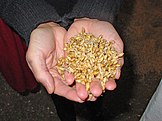Portal:Drink
The Drink Portal
A portal dedicated to all beverages
Introduction

A drink or beverage is a liquid intended for human consumption. In addition to their basic function of satisfying thirst, drinks play important roles in human culture. Common types of drinks include plain drinking water, milk, juice, smoothies and soft drinks. Traditionally warm beverages include coffee, tea, and hot chocolate. Caffeinated drinks that contain the stimulant caffeine have a long history.
In addition, alcoholic drinks such as wine, beer, and liquor, which contain the drug ethanol, have been part of human culture for more than 8,000 years. Non-alcoholic drinks often signify drinks that would normally contain alcohol, such as beer, wine and cocktails, but are made with a sufficiently low concentration of alcohol by volume. The category includes drinks that have undergone an alcohol removal process such as non-alcoholic beers and de-alcoholized wines. (Full article...)
Selected article -
noitulovE ("Evolution" backwards) is a British television and cinema advertisement launched by Diageo in 2005 to promote Guinness Draught stout. The 60-second piece formed the cornerstone of a £15 million advertising campaign targeting men in their late twenties and early thirties. The commercial shows, in reverse, the adventures of three characters who evolve from mudskippers to present day humans before tasting Guinness in a London pub. The commercial was handled by the advertising agency Abbott Mead Vickers BBDO, with a budget of £1.3M. It was directed by Daniel Kleinman. Production was contracted to Kleinman Productions, with post-production by Framestore CFC. It premiered on British television on 3 October 2005.
noitulovE is the fifth television/cinema piece in the Good things come to those who wait series, and its premiere marked the end of a four-year hiatus. The advert and its associated campaign were a critical and financial success. It received over 30 awards from professional organisations in the advertising and television industries, and was the most-awarded commercial worldwide in 2006. The impact of the campaign was such that during a period in which the UK beer market experienced a substantial decline in revenue, Guinness reported that its year-on-year earnings within the region had noticeably increased. At the same time, Guinness achieved its highest-ever volume and value shares and became the market leader within the region. This was attributed in no small part to the positive reception of noitulovE. (Full article...)
Did you know? -
- ... that in 1776 Abraham Hunt entertained Hessian mercenaries with food and drink to render them incapable for duty the night before George Washington defeated them at Trenton?
- ... that the "Mayor of Picklesburgh" is decided by a pickle juice drinking competition?
- ... that Al-Rantisi Hospital can extract drinking water from air?
- ... that the John Snow pub is named for a shy British epidemiologist who did not drink?
- ... that Ben Phillips replaced his friend's hair gel with superglue, put Viagra in his sports drink, and placed him on a lake while he slept on an inflatable mattress?
- ... that Phil Elverum recorded Don't Wake Me Up nocturnally, while "drinking pots of black tea all night"?
General images -
Selected image -

Selected biography -

Selected quote -
| “ | Good wine is a good familiar creature if it be well used. | ” |
| — William Shakespeare (1564-1616) Othello II. iii. (315) |
Selected ingredient -
Topics
| General topics: | Bartending • Bottling • Drinking • Drinking water • Bottled water • Mineral water • Coffee • Energy drink • Juice • Tea • Milk • Plant milk • Pasteurization • Refrigeration • Steeping • Water purification |
| Alcoholic beverages: | Beer • Brandy • Brewing • Caffeinated alcoholic drinks • Cider • Cocktails • Distillation • Fermentation • Hard soda • Liquor • Liqueur • Malt drink • Mead • Proof • Rice Wine • Schnapps • Vodka • Whiskey • Wine |
| Soft Drinks: | Carbonation • Cola • Orange soft drink • Frozen carbonated drink • Root beer • Soda water • Lithia water • |
| Miscellaneous: | Drink industry • Lemonade • Limeade • Orange drink • Slush (beverage) |
List articles
Subcategories
Related portals
WikiProjects


WikiProject Food & Drink is an association of Wikipedians with an interest in culinary-related subjects. They have come together to co-ordinate the development of food and drink articles here on Wikipedia as well as the many subjects related to food such as foodservice, catering and restaurants. If you wish to learn more about these subjects as well as get involved, please visit the project.
 WikiProject Beer – covers Wikipedia's coverage of beer and breweries and microbreweries
WikiProject Beer – covers Wikipedia's coverage of beer and breweries and microbreweries
![]() WikiProject Wine – aims to compile thorough and accurate information on different vineyards, wineries and varieties of wines, including but not limited to their qualities, origins, and uses.
WikiProject Wine – aims to compile thorough and accurate information on different vineyards, wineries and varieties of wines, including but not limited to their qualities, origins, and uses.
| Child projects: | Task forces: (All inactive) |
| Related projects: | |
Things you can do
 |
Here are some tasks awaiting attention:
|
Associated Wikimedia
The following Wikimedia Foundation sister projects provide more on this subject:
-
Commons
Free media repository -
Wikibooks
Free textbooks and manuals -
Wikidata
Free knowledge base -
Wikinews
Free-content news -
Wikiquote
Collection of quotations -
Wikisource
Free-content library -
Wikiversity
Free learning tools -
Wiktionary
Dictionary and thesaurus




































































